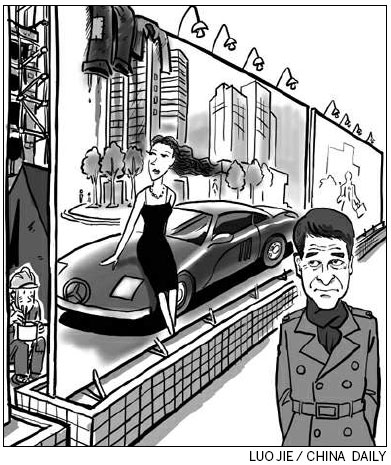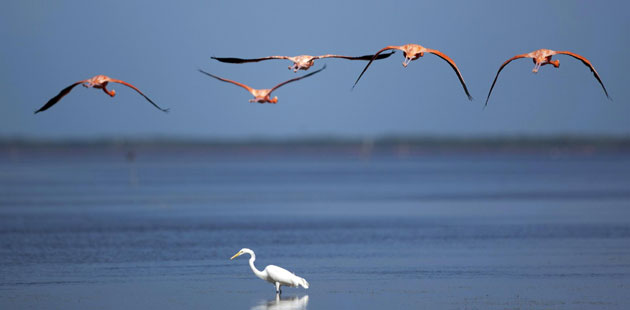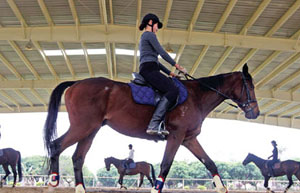Where the real deal sometimes hides behind fantastical facades
Updated: 2011-12-20 09:51
By John Clark (China Daily)
|
|||||||||

What is it about Beijing property developers?
They don't seem content to simply erect fences to mark off their construction sites.
No, they have to put up elaborate screens that depict the completed building so accurately that it's hard to tell if it's real or fake.
In other cases, developers put up hoardings that represent the idealized lifestyle their new apartments will afford lucky buyers.
There's a billboard in Dongcheng that carries a picture of three green apples. But if you look more closely, you realize they are the torsos of a man (the big apple), a woman and a child - in other words, the perfect Chinese family.
Another screen advertises a new apartment block in the same development. It features a young couple, elegant in Western evening attire, standing in a flagstone-floored lounge in front of an ultramodern living flame gas fire.
The message seems to be that you can have it all - success, a luxurious lifestyle - if only you buy an apartment here.
Other screens erected in public places have an element of trompe l'oeil. They deceive the eye of the beholder into thinking that he or she is looking at a wall, a woodland or a garden.
It's only when you notice wrinkles in the material on which the wall has been screen-printed that you realize you've been fooled.
What looks like a green meadow behind benches in Zhongshan Park isn't what it seems. You can see the borders top and bottom of the screen-print.
An art critic might quibble about this being true trompe l'oeil, since an essential element of this art form is a three-dimensional optical illusion.
But these hoardings and screen-prints have perspective enough to fool many passersby.
A friend has printed a book of photos entitled Beijing Fake. Mark Ray, an Australian journalist, was inspired by a remark made by my wife. It was during the drought.
We'd watched spectacular thunder and lightning, and waited for downpours of rain, which would happen inevitably at home in Scotland.
But the ground remained bone dry. To my wife's mind, this was freak, or fake, weather.
At the start of this year the Met Office people seeded the clouds to produce precipitation. The result was a snowfall, to which my wife remarked: "It's not real snow. Like a lot of things in Beijing, the snow is fake."
Her remark prompted Ray's theme. He photographed couples having their wedding pictures taken at Fragrant Hills.
"What's fake about that?" I asked.
He explained most couples have their album pictures taken months before they get married, not on the day they get spliced.
He photographed a blissful bride-to-be clutching balloons amid a field of daisies.
Ray reckons the booming wedding industry in China smacks of fake sentiment.
On the other hand, there's nothing wrong with disguising building work. Another of Ray's photos is of a camp for migrant construction workers in Dongcheng district. You can't see their tents because they are obscured by a screen-printed tarpaulin depicting an idyllic parkland. Workmen's clothes hung over the screen give the game away.
A photo shows a wall on Huixin Dongjie. But the end of the wall has been pulled aside to allow access to a construction site.
A property developer bought the former Post Office building on George Square in Glasgow, my hometown. He renovated part of it and sold off upscale apartments. Plans to convert the rest of the building into a five-star hotel didn't happen. But the developer made a fortune using the facade as a giant advertising hoarding.
City fathers lost patience and took over the refurbishment. While it proceeded, the building was screened by an artist's impression of what the building would look like when it was finished.
So perhaps we are no different in the West in wanting to mask ugly works in progress with fake images.
What's not fake, my wife says, is the warmth and kindness of the Chinese friends we've made in Beijing. That's for real.











